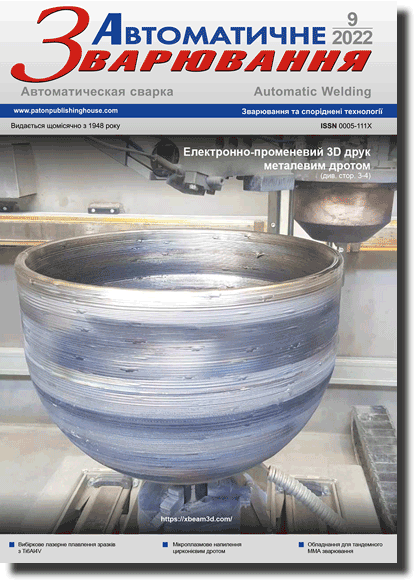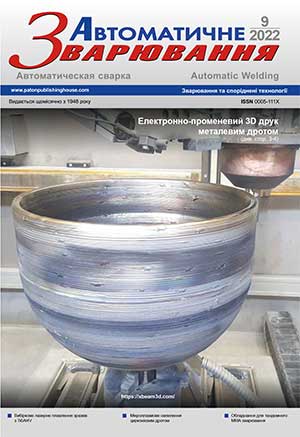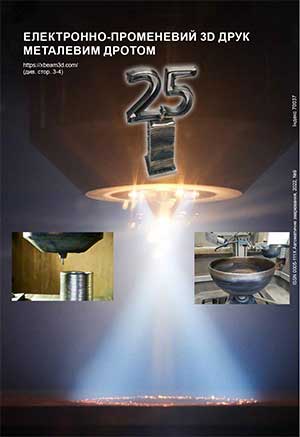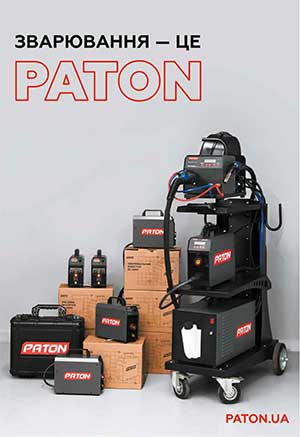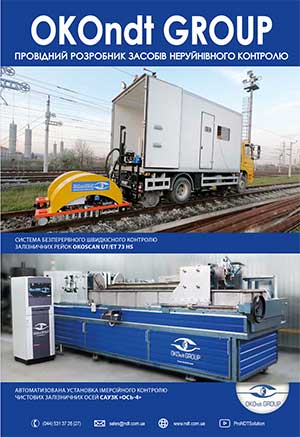| 2022 №09 (07) |
DOI of Article 10.37434/as2022.09.08 |
2022 №09 (09) |
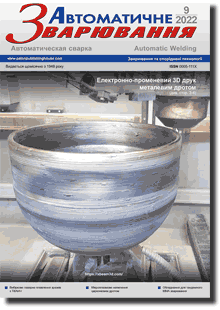
"Avtomatychne Zvaryuvannya" (Automatic Welding), #9, 2022, pp. 45-50
Microplasma spraying of coatings using zirconium wire
S.G. Voinarovych1, D.L. Alontseva2, O.M. Kyslytsia1, S.M. Kalyuzhnyi1, T.V. Tsymbalista1, M.M. Dyman1
1E.O. Paton Electric Welding Institute of the NAS of Ukraine. 11 Kazymyr Malevych Str., 03150, Kyiv, Ukraine. E-mail: office@paton.kiev.ua
2D. Sekirbayev East-Kazakhstan Technical University, 69 Protozanov Str., Ust-Kamenogorsk, 070004, Kazakhstan. E-mail: kanc_ ekstu@mail.ru
The work is devoted to studying the process of microplasma spraying of coatings from zirconium wire. Technological possibility of formation of porous biocompatible Zr-coatings with bulk porosity in the range from 2 to 20% and up to 300 ~m size is demonstrated. It is shown that controlling the content of bulk porosity in Zr-coating allows changing the modulus of elasticity, reducing it 14 times compared to the initial cast material that allows getting closer to bone modulus and reducing the stress shielding. The values of the strength of adhesion of Zr-coating to the base from an alloy of VT6 grade were determined, its average value being higher than 26.9 ± 4.7 MPa and meeting the international requirements of ISO 13179–1:2021. Based on the obtained investigation results, the values of technological parameters were established for deposition of biocompatible Zr-coatings by the method of microplasma spraying of the wire from KTTs-110 grade alloy that allows forming functional coatings on the surface of diff erent types of endoprotheses, which will provide a stronger and more reliable bonding of the endoprosthesis with bone tissue. 16 Ref., 3 Tabl., 6 Fig.
Keywords: microplasma spraying, zirconium coating, endoprostheses, porosity, adhesion
Received: 18.07.2022
References
1. Matassi, F., Botti, A., Sirleo, L. et al. (2013) Porous metal for orthopedics implants. Clinical Cases in Mineral and Bone Metabolism, 10(2), 111-115, PMID: 24133527. DOI: 10.11138/ccmbm/2013.10.2.1112. Cizek, J., Matejicek, J. (2018) Medicine Meets Thermal Spray Technology: A Review of Patents. Journal of Thermal Spray Technology, 27(8), 1251-1279. https://doi.org/10.1007/s11666-018-0798-8
3. Civantos, A., Dominguez, C., Pino, R.J. et al. (2019) Designing bioactive porous titanium interfaces to balance mechanical properties and in vitro cells behavior towards increased osseointegration. Surface and Coatings Technology, 368, 162-174. https://doi.org/10.1016/j.surfcoat.2019.03.001
4. Liu, W., Liu, S., Wang, L. (2019) Surface Modification of Biomedical Titanium Alloy: Micromorphology, Microstructure Evolution and Biomedical Applications. Coatings, 9(4), 249. https://doi.org/10.3390/coatings9040249
5. Malyshkina, S.V., Dedukh, N.V., Gruntovsky, G.Kh. et al. (1998) Morphological features of osseous tissue change in plasty of defects by hydroxyapatite ceramics. Ortopediya, Travmatologiya i Protezirovanie, 3, 110-114 [in Russian].
6. Dubok, V.A. (2000) Bioceramics - yesterday, today, tomorrow. Poroshk. Metallurgiya, 7/8, 69-87.
7. Torres-Sanchez, C., Al Mushref, F.R.A., Norrito, M. et al. (2017) The effect of pore size and porosity on mechanical properties and biological response of porous titanium scaffolds. Materials Science and Engineering: C, 77, 219-228. https://doi.org/10.1016/j.msec.2017.03.249
8. Cook, S.D., Georgette, F.S., Skinner, H.B., Haddad, R.J (1984). Fatique properties of carbon- and porous-coated Ti‑6Al‑4V-alloy. Journal Of Biomedical Materials Research, 18, PMID: 6736080. DOI: 10.1002/jbm.820180504 https://doi.org/10.1002/jbm.820180504
9. Kurodaa, D., Niinomib, M., Morinagac, M. et al. (1998) Design and Mechanical Properties of New β Tipe Titanium Alloys for implants Materials. Materials Science and Engineering, 243 (1-2), 244-249. https://doi.org/10.1016/S0921-5093(97)00808-3
10. Pilipenko, N.N., Drobyshevskaya, A.A., Azhazha, R.V. et al. (2013) Zirconium-based materials for producing medical implants. Zhurnal KhNU, 1059, 105-109 [in Russian].
11. Sherepa, K.M., Parfenov, A.V., Zyushmanovich, I.S. (1992) To problem of application of zirconium alloys for endoprosthesis and means of osteosynthesis. Meditsinskaya Tekhnika, 5, 14-16 [in Russian]. PMID: 1474864
12. Borisov, Yu.S., Kislitsa, A.N., Vojnarovich, S.G. (2006) Peculiarities of the process of
13. Alontseva, D.L., Borisov, Yu.S., Voinarovych, S.G. et al. (2018) Development of microplasma spraying technology for applying biocompatible coatings. Materials Physics and Mechanics, 39, 102-110. DOI:10.18720/МПМ.3912018_16
14. Moltasov, A., Dyman, M., Kaliuzhnyi, S. et al. (2022) Dependence of the elasticity modulus of microplasma coatings made of titanium grade VT1-00 and zirconium grade KTC‑110 on their porosity. Series on Biomechanics, 37, 2. https://doi.org/10.7546/SB.36.2022.02.14
15. Loskutov, V.S., Dekhtyar, L.I. (1985) Mechanical properties of plasma sprayed coatings of zirconium boride, copper, and composites of them. Soviet Powder Metallurgy and Metal Ceramics, 7(24), 570-572. https://doi.org/10.1007/BF00795194
16. Mohamad Ikhwan Zaini Ridzwan, Solehuddin Shuib, Hassan A.Y., Shokri A.A., Mohamad Ibrahim M.N. (2007) Problem of Stress Shielding and Improvement to the Hip Implant Designs. Journal of Medical Sciences, 7(3), 460-467. https://doi.org/10.3923/jms.2007.460.467
Advertising in this issue:
The cost of subscription/purchase order journals or individual articles
| Journal/Currency | Annual Set | 1 issue printed |
1 issue |
one article |
| TPWJ/USD | 384 $ | 32 $ | 26 $ | 13 $ |
| TPWJ/EUR | 348 € | 29 € | 24 € | 12 € |
| TPWJ/UAH | 7200 UAH | 600 UAH | 600 UAH | 280 UAH |
| AS/UAH | 1800 UAH | 300 UAH | 300 UAH | 150 UAH |
| AS/USD | 192 $ | 32 $ | 26 $ | 13 $ |
| AS/EUR | 180 € | 30 € | 25 € | 12 € |
| SEM/UAH | 1200 UAH | 300 UAH | 300 UAH | 150 UAH |
| SEM/USD | 128 $ | 32 $ | 26 $ | 13 $ |
| SEM/EUR | 120 € | 30 € | 25 € | 12 € |
| TDNK/UAH | 1200 UAH | 300 UAH | 300 UAH | 150 UAH |
| TDNK/USD | 128 $ | 32 $ | 26 $ | 13 $ |
| TDNK/EUR | 120 € | 30 € | 25 € | 15 € |
AS = «Automatic Welding» - 6 issues per year;
TPWJ = «PATON WELDING JOURNAL» - 12 issues per year;
SEM = «Electrometallurgy Today» - 4 issues per year;
TDNK = «Technical Diagnostics and Non-Destructive Testing» - 4 issues per year.





